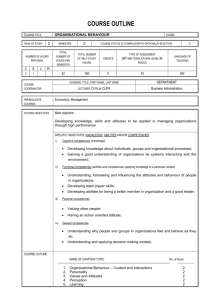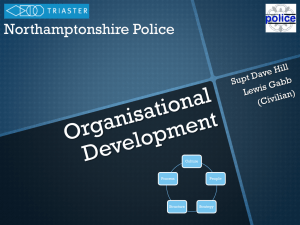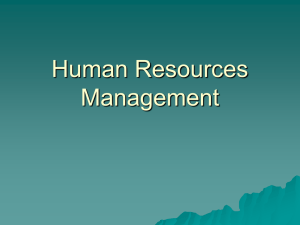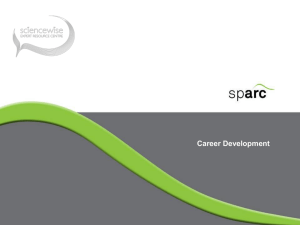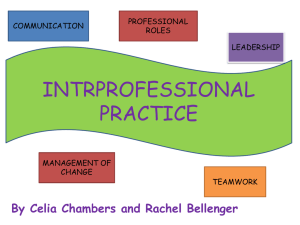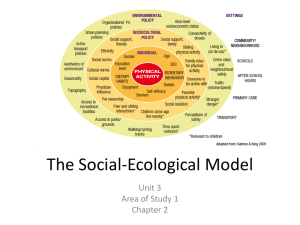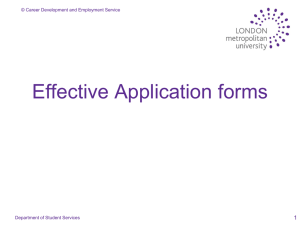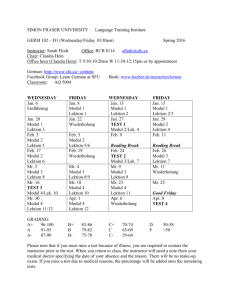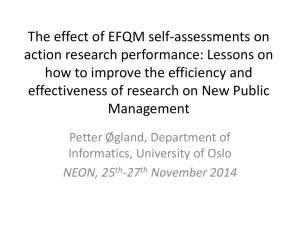AZ ELŐADÁS FŐCÍME
advertisement
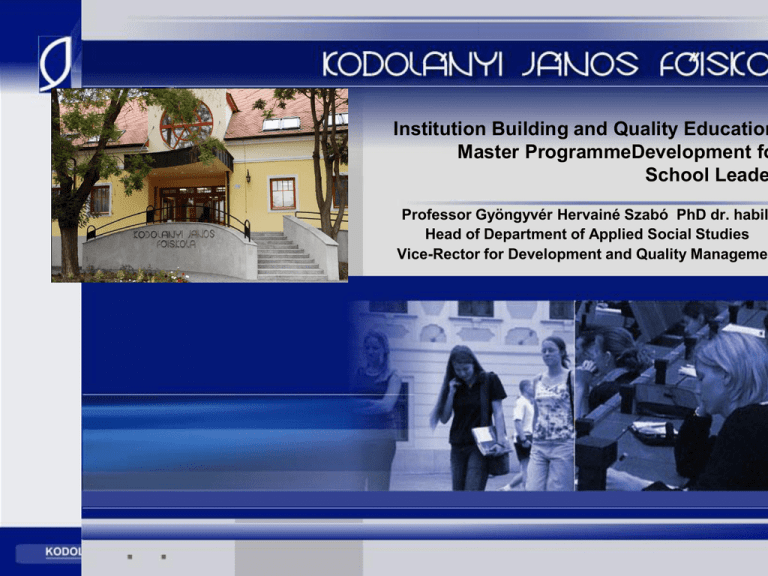
Institution Building and Quality Education Master ProgrammeDevelopment fo School Leade Professor Gyöngyvér Hervainé Szabó PhD dr. habil Head of Department of Applied Social Studies Vice-Rector for Development and Quality Managemen Institution building and quality education Common value development through education by service science Students Teachers Students needs Social resources: status Family relationship Educational relationships Groupes reltionship by programmes Relationship with professional institutions, Cultural resources: basic knowledge, learning abilities, thinking, Prospects for future, peer models, personal life history, family expectations, spatial resources for learning Physical resources: senso motoric abilities, emotions, energies, communication abilities. Allocation and authority ability Students operational resources Teachers operation al resources Goals, Life roles Life projects, Life narrratives Results of education Institution building and quality education Social resources: social networks, professional, economic status, level of education and professionalism, professional relationships, Family resources Allocation and authority ability Cultural resources: specialised knowledge, didactic ability and culture, library, departmental culture, physical resources for teaching Physical resources: emotional intelligence, voice, energie, emotions, communication ability KJU education service coproduction model : value and quality KJU in educational processes • Information giving • Educational Programme development • Student and learning administration • Education and personal development • Mesuring and Evaluation Progress Student in educationa processes • Asking information, understanding own needs • Understanding education programmes ands specification for jobs • Personal portfolio, plans for semesters, • Learning (contact ours, tasks, practice • Exams, projects other tasks Interactions, processes, values Values and quality in educational processes • Results of education as value dvelopment, growing prestige for programme • Growing prestige for teachers • Growing value of diplomes • Jobs for graduated students • Growing percent of inhabitants with diplomes in local areas • Growing attractive capability of localities Value and effectiveness in learning processes • Effectiveness of learning as growing prestige with value creating • Growing prestige for students • Growing number of diplomes • Growing number of competitive jobs, and good salaries for students • Firms became interested in human capital development, in inner trainings • Growing social economical value of firms Institution building and quality education Main question: How we can develop schools into high performance organisations , comparable to excellent business organisations? KJUAS pedagogical model: profession centric teacher education The concept of MA teacher in quality development, or MA teacher in institution development had a more complex task. The core concept of the programme have to be around teacher as professional personality for school development. 29th October 2012. Aarau Institution building and quality education Dublin descriptors vocabulary The word ‘professional’ is used in the descriptors in its broadest sense, relating to those attributes relevant to undertaking work or a vocation and that involves the application of some aspects of advanced learning. The word ‘competence’ is used in the descriptors in its broadest sense, allowing for gradation of abilities or skills. It is not used in the narrower sense identified solely on the basis of a ‘yes/no’ assessment. The word ‘research’ is used to cover a wide variety of activities, with the context often related to a field of study; the term is used here to represent a careful study or investigation based on a systematic understanding and critical awareness of knowledge. The word is used in an inclusive way to accommodate the range of activities that support original and innovative work in the whole range of academic, professional and technological fields, including the humanities, and traditional, performing, and other creative arts. It is not used in any limited or restricted sense, or relating solely to a traditional 'scientific method'. Institution building and quality education Comparing competencies and capabilities Theme Competencies Capabilities ( abilities, competencies and knowledge) Economics, social justice and quality theories Disciplines Work sociology Management Focused Autonomy for doing job Personal development through different development cycles, work sycles, freedom for decisions, capability for participation Context Narrow Goals and tasks are focused for one organisation, where the individual is employed Individual abilities for using possibilities and resources to gain goals developed by organisations and leaders Large, embedded into context by timely and spatially organised personal and professional life of individual Definition Capability factors: freedoms for individual decisions, personal performance, capability for realisation goals for pupils, capability for relaxed, open and emotionally right oppinion giving Institution building and quality education Main challenges in programme development 1. We had an official competency description system – it is similar to ISO quality system management course, and EFQM self-evaluation programme. The model was a mix of ISO 9001 and EFQM model, and elements of so called Comenius 2000 model, a TQM based model for schools – like a postgraduate programme, practice oriented 2. European Qualifications Framework for Life Long learning, and Dublin descriptors: highly specialised knowledge, some of which is at the forefront of knowledge in a field of work or study, as the basis for original thinking and/or research, critical awareness of knowledge issues in a field and at the interface between different fields, specialised problem-solving skills required in research and/or innovation in order to develop new knowledge and procedures and to integrate knowledge from different fields manage and transform work or study contexts that are complex, unpredictable and require new strategic approaches take responsibility for contributing to professional knowledge and practice and/or for reviewing the strategic performance of teams Institution building and quality education Competencies in Ma in quality development teachers- specialised leadersip capabilities Understanding Quality matters in EU; quality philosophies, quality management systems, models (TQM, minőségfilozófiák, minőségirányítási rendszerek, modellek (ISO, TQM, EFQM, ), special educational system models developed in Hungary and other countries Institutional evaluation, self evaluations in European countries and Hungary Human factors in case of quality development capabilities: role of changes in human life and life of organisations Quality development tools and techniques, data collecting and analysing, development measurement tools, databases… Quality development as part of strategic development: institutional quality programmes, development programmes, edcational programmes projects in educational organisations. Partnership analyses, needs and satisfaction analyses, using theirs results in quality development, organisational processes. Special features of quality management in different type of elementary, grammar and vocational institutions, institutions for special purposes. Special competencies concerning practices : cooperation, team work, goal setting, planning, program and project management. Quality education didactic in schools: understanding international trends in educational quality management, challanges in case of public education. Institution building and quality education Dublin Descriptors for Master Level – a more capabilty oriented approach Knowledge and understanding: a systematic understanding of their field of study concerning leadership and quality management and mastery of the methods of research* associated with quality. Applying knowledge and understanding: problem solving abilities [applied] in schools or other education service environments within broader (or multidisciplinary) social and local contexts .. Making judgements: capable of critical analysis, evaluation and synthesis of new and complex ideas concerning school development Communication: master level in case of school leadership to specialist and non-specialist audiences, teachers, students, parents. Learning skills : study in a new manner that largely self-directed and autonomous.. Institution building and quality education Structure MA Programme Teacher in Quality Development Ist modul: Knowledge Society and Strategy 1. Basic Strategic planning and leadership in 21st century Quality strategy Contact 24 Strategic planning project seminar Strategic Planning in school seminar 5 exam 6 6 Institution building and quality education 5 2nd modul: Approaches to Quality 2. Subject Quality development Contact Introduction to theory of Social 24 Quality Exam Quality development:excellence 6 models 3. Subject Bábosik Comparative approaches to 20 educational quality Project seminar Quality models in European Public Policy and Public 5 administration Quality systems for public exam education, vocational education 5 and adult education in Europe Quality in higher education 5 Urban and rural inequalities and quality education 5 Institution building and quality education 5 5 5 5 3rd modul: Quality literacy ,knowledge, expert learning, innovation and analyse 4. Subject Contacts Practice Quality methods, tecniques, models 24 Using quality techniques in education Quantitative and qualitative methods Action research in education 5. Subject 6 5 6 practice 5 5 5 Quality education didactics: social life competencies and quality Professional quality development teacher Motivation and learning: classroom management a quality approach Helping student learning 6. Subject Organisational culture and Innovation Quality development and supervision 7. Subject Performance management in Schools Schools and competitiveness Higher education competitiveness 20 Practice 5 5 5 5 Szabó Péter 20 10 Hercz Mária Institution building and quality education 5 Practice 5 5 24 6 6 Practice 5 4th modul: participative processes of quality development: internship modul 9. Subject Contacts Self-evaluation : applying for quality awards 5 15 5 Quality results evaluations: evaluation of institutional quality culture 15 Group practice 60 Prepearing for group practice 10 Gyakorlati jegy Individual Practice: student portfolio Thesises Institution building and quality education 5 Response to didactic principles – development of cognitive resources for students 1. Introductory course Appreciative inquiry 2. Master in teacher for quality development Personal Balanced Score Card 3. For teachers of Applied Studies Department Personal Balanced Score Card 5. Department Management Philosophy Business Score Card and service science approach Institution building and quality education Using Appreciative Inquiry in MA teacher in Quality Management Principle 1. The words can develop worlds – self- fullfilement strategies Stratégy 1.Opening positive roots from student personality, strengths individually, groups, for development Principle 2. Positive self image can develop positive activity, moving to positive strengths, empowerment of students Stratégy 2. 1. We have to think the future of students, what He or She wants to gain individually or in groups Principle 3. Quality of relationships is key to success, effective teamwork, real and open communication creativity and innovation, leadership tasks for students Stratégy 3. Sharing experiences, stories for developing quality based relationships, empathy, mutuality, honour, originality and secure athmosphere Principle 4. Opening deep and closed possibilities in persons, new perspectives and alternatives for them Stratégy 4. Deepening relationship among actors of education: understanding theirs perspectives on the basis of diversity and common goals Institution building and quality education Appreciative Inquiry as a coaching technique in forming students learning • Explore the best performances • Thinking about what can be Discovery To think the dreams Forming our fate Planning the dreams • Understanding consequency for doing or delaying activities Institution building and quality education • To think about activities needed for dreams 5 D model using appreciative inquiry Institution building and quality education Business Score Card Institution building and quality education Using Personal Business Core Card for development capability of students for leadership roles Personal BSC Organisational BSC Personal Mission, Organisational Mission Personal Vision Organisational Vision Personal Roles Organisational Values Personal Critical Success Factors Organisational Critical Success Factors Personal Goals and Tasks Organisational Goals and Tasks Personal Performance Measurements and Indicators Organisational performance Measures and Indicators Personal Development Actions Organisational Developments Actions Institution building and quality education PBSC for capability of students for leadership roles • Self image, self knowledge • Behavior embedded in everyday activity • Self reflections • Personal intentions, identity, ideals, values • Personal drivers Personal ambitions Individual learning Personal ambitions Individual learning Common ambition Collective learning Common ambition Collective learning • Organisational roles and identity • Common intentions, values • Common image, knowledge, collective behavior Motivation, selfmanagement, pleasure, added value, win-win position, inner engagement, ethical behavior, less stress and work out sindrome Institution building and quality education Coproduction value development : Personal Business Score Card for teachers Financial perspectives • Good status and life role orientation model • Gaining leadership statuses • Alternative incomes for teachers • Better income possibilities Understanding students needs • Needs assessment with AI and PBSC • Development high value subject content • Measuring student performance • Measuring students results and satisfaction Understanding educational processes perspective • Competencies for researching subjects, research and foreign language competencies • Knowledge of profession • Didactic and student performance measurement competencies • Competencies for administrative and emotional life management: AI, BSC, PBSC, Strategy map • Understing contexts for curriculum, institutional goals • Innovations, innovative teams in education, new Learning processes motivations perspective • Training of teachers, professional relations • Individual, group and network management Institution building and quality education Summary: development competency and capabilities of students and university teachers using business and quality methods 1. Student in MA education: Appreciative inquiry 2. Understanding school development: Balance Score Card 3. Ma in quality development teacher: Personal Balanced Score Card 4. Training for teachers: AI as training for coaching Personal Balanced Score Card for teachers, to fulfill roles 5. Department management: BSC and Service Science approach in co-production of values in education Institution building and quality education Main expectations from the programmes Students: mostly 35 – 57 years olds people motivation personal aims: to get or fulfill leadeship roles, new leaders, to influence others without formal power personal carrier aims: to get a new degree, to get a new salary personal development aims: new capabilities, new communication style, business style document development personal development aims.: new research capability development Collective aims: how to help theirs school from closing, or get for it new role University teachers: to rise knowledge level in quality literacy help to understand expectation of founders, local authorities, quest for quality drive to develop teachers capabilities as „social engineers” for a better society and better school, to understand a new role of teachers in society Institution building and quality education Problems and conflicts in approaches Students: were waiting education for practice knowledge Teachers: were waiting people with good communication capabilities First shocks: public school teachers were weak in academic writings, one third of them was very weak in computer literacy Methods: sound coaching in academic writing – an essay was given back 3-4 times to rewrite Teachers were very creative in using school document, it was difficult to make a decision whose job the document was Teachers were good in team tasks, and this helped them to fulfill students role in situation Institution building and quality education Results: close to 100 students were awarded with diploma MA teacher in Quality Development in 5 year Students: 20 % of students was declaring high satisfaction with programme 75 % of students was very satisfied 5 % of students was mostly satisfied. Former students became regularly attenders at quality conferences We could develop experts and regular conference speakers They became active persons in education policy formation Teachers: The programme made university teachers very enthusiastic It was a new model for renewing hgigher education didactics They could get a national fame together with other 2 programmes It was influenced for other departments culture, too. Institution building and quality education Thank You for Your attention! Institution building and quality education
